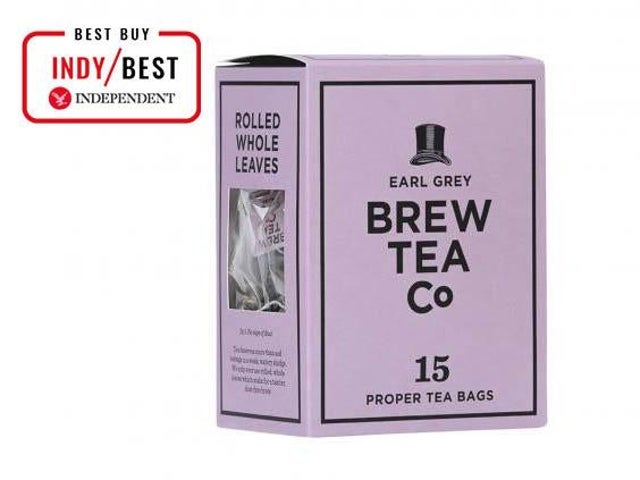
The Independent's journalism is supported by our readers. When you purchase through links on our site, we may earn commission. Why trust us?
12 best plastic-free tea bags to make your brew better for the planet
Be kind to the environment – without sacrificing the most important drink of the day
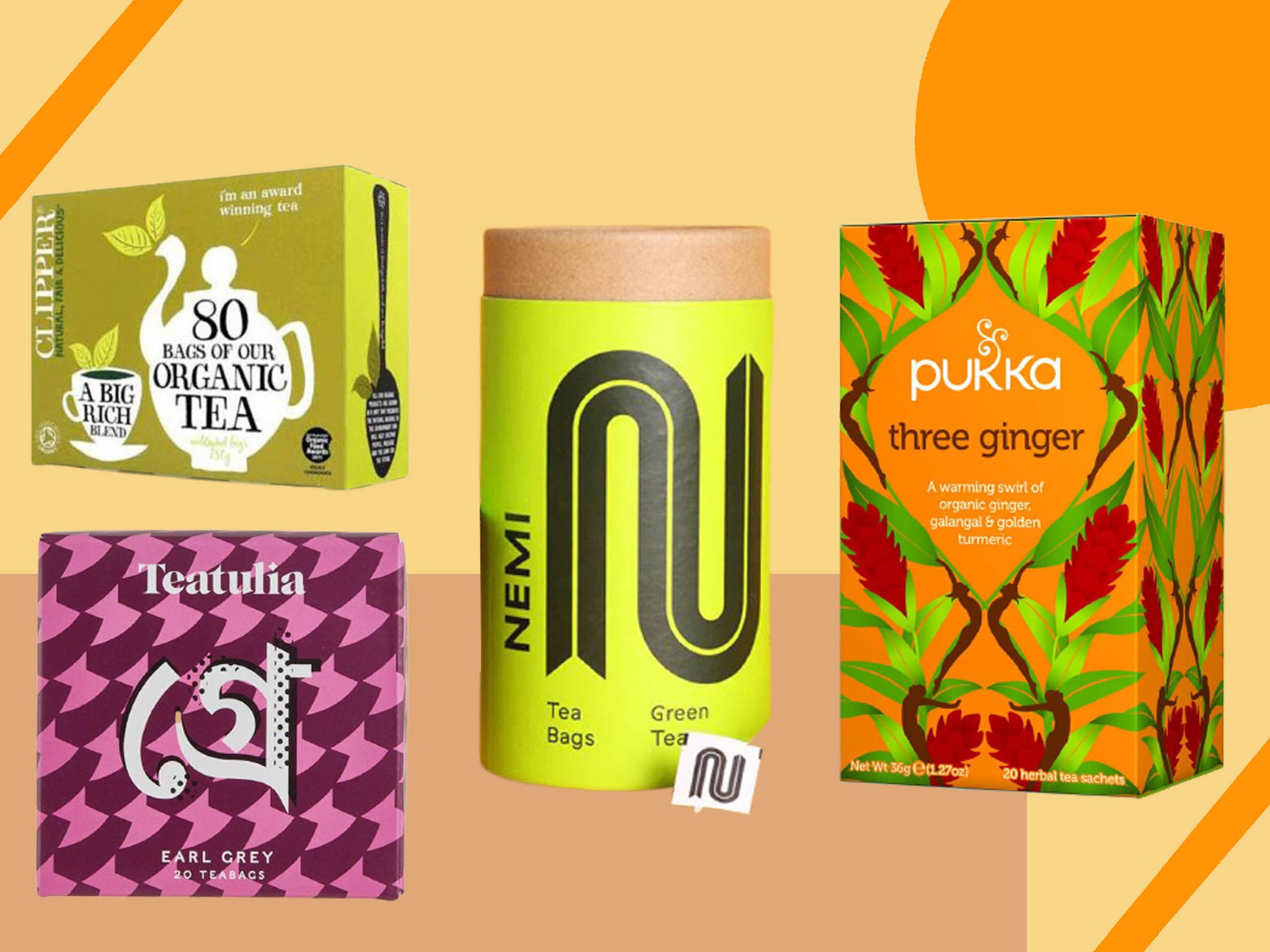
Plastic Free July is upon us – and whether you’re ditching single-use plastic for a month or making small swaps for the foreseeable, big tea drinkers may want to start with their morning brew.
You might think tea bags are just simply paper and tea, that they decompose, and that you’re doing your bit by putting them in your home food waste to compost. But, you’re wrong – unless you use plastic-free tea bags, that is.
In actual fact, many of the tea bags we buy contain polypropylene, which is what the tea bags are sealed with, so when you put in the used bags in your food waste, you’re actually putting toxic chemicals into your beautiful compost that will eventually seep into the ground.
Some plastic-free tea brands differ between being biodegradable and compostable, which is important to know about, so you can deal with your used tea bag correctly.
The former means it will be broken down by a biological process, which needs the right conditions to successfully decompose – this is most often found at industrial level, where a higher heat is used than you can achieve in your garden. And the latter is able to break down in home garden composting conditions and will work as a fertiliser afterwards.
Read more:
There are lots of brands who champion making tea bags without these tiny plastic pieces, and there’s more that are changing to rid themselves of it, too. But if your favourite brand doesn’t offer a plastic-free bag of your most-loved brew, you can also use loose leaf tea.
How we tested
We looked for brands that not only use alternative materials to plastic in the actual tea bag, but ones that also remove plastic from the packaging, reduce excess materials and tags, pay producers a fair wage, and of course, taste excellent.
The best plastic-free tea bags for 2022 are:
- Best overall – Brew Tea Co proper tea earl grey, for 15: £4.59, Brewteacompany.co.uk
- Best for affordability – Clipper organic everyday tea, for 80: £3.49, Clipper-teas.com
- Best for gifting – Hampstead Tea whole leaf home compostable pyramids, for 20: From £2.79, Hampsteadtea.com
- Best without string – We Are Tea English breakfast tea, for 15: £3, Amazon.co.uk
- Best from a cafe – Eteaket royal earl grey tea bags, for 20: £6.95, Eteaket.co.uk
- Best social enterprise brand – Nemi Tea green tea, for 15: £4.95, Nemiteas.com
- Best for a weekend brew – T2 French earl grey teabag gift cube, for 25: £8, T2tea.com
- Best for innovative flavours – Roqberry, for 18: £6, Thefoodmarket.com
- Best wrapped in envelopes – Pukka Herbs, for 20: £3.29, Hollandandbarrett.com
- Best pillow shaped tea bag – Good & Proper Tea, for 15: From £5, Goodandpropertea.com
- Best high street brand – Twinings loose leaf pyramid bag, for 15: £6.50, Twinings.co.uk
- Best forward thinking brand – Teapigs everyday brew tea bags, for 15: £3.50, Ocado.com
Brew Tea Co proper tea earl grey, for 15

Best: Overall
This brand is as transparent and sustainable as they come, and makes it all fun too. Brew Tea – based in Manchester, uses whole leaves (not dust, it insists) and is a member of the Ethical Tea Partnership which supports small estate growers. This is a refreshing brew, full of flavour and depth (no weak tea here) mixing bergamot oil with ceylon black tea, orange peel and calendula petals.
We use this brew as our everyday tea and love it. All the tea bags from the brand are made from cornstarch, the inner lining is made from NatureFlex and inside the box is a really useful card telling you what all the packing is made from and how it should be recycled: from the tea bags and inner lining which decompose in 45 days via your council food recycling bin, to the outer box which goes into the paper recycling. You can buy them in packs of 100 now too – for £17.99 if you subscribe, or £20 as a one off.
Clipper organic everyday tea, for 80
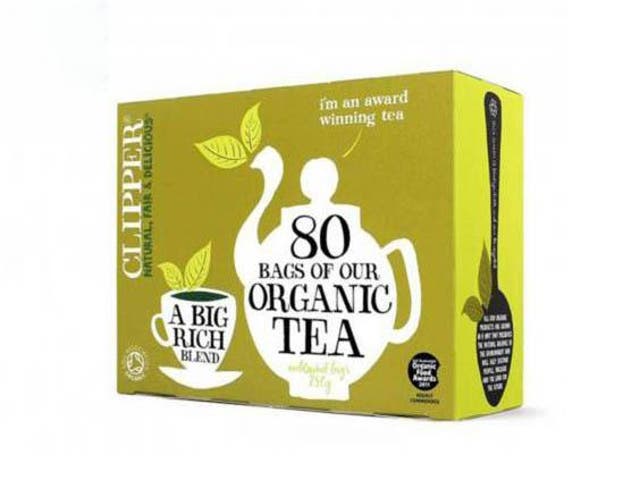
Best: For affordability
It might look most like an ordinary tea bag, but this is far, far from it. Each bag is unbleached (hence its more earthy colour), organic, Fairtrade, plastic-free and non GM. It was the world’s first pillow-shaped bag to meet this criteria and was launched in 2018. And if that’s not enough, it was even the world’s first Fairtrade tea.
The teabag is made from abaca plants – a type of banana – and the plastic that once sealed the bag has been replaced with a material made from non-GM plants. It’s become one of our go-to everyday teas, just like it says in the name, and is by far the most affordable on the list. Although Clipper has ticked many boxes with its teabag, it’s now working on making the inner foil packaging recyclable too.
Hampstead Tea whole leaf home compostable pyramids, for 20
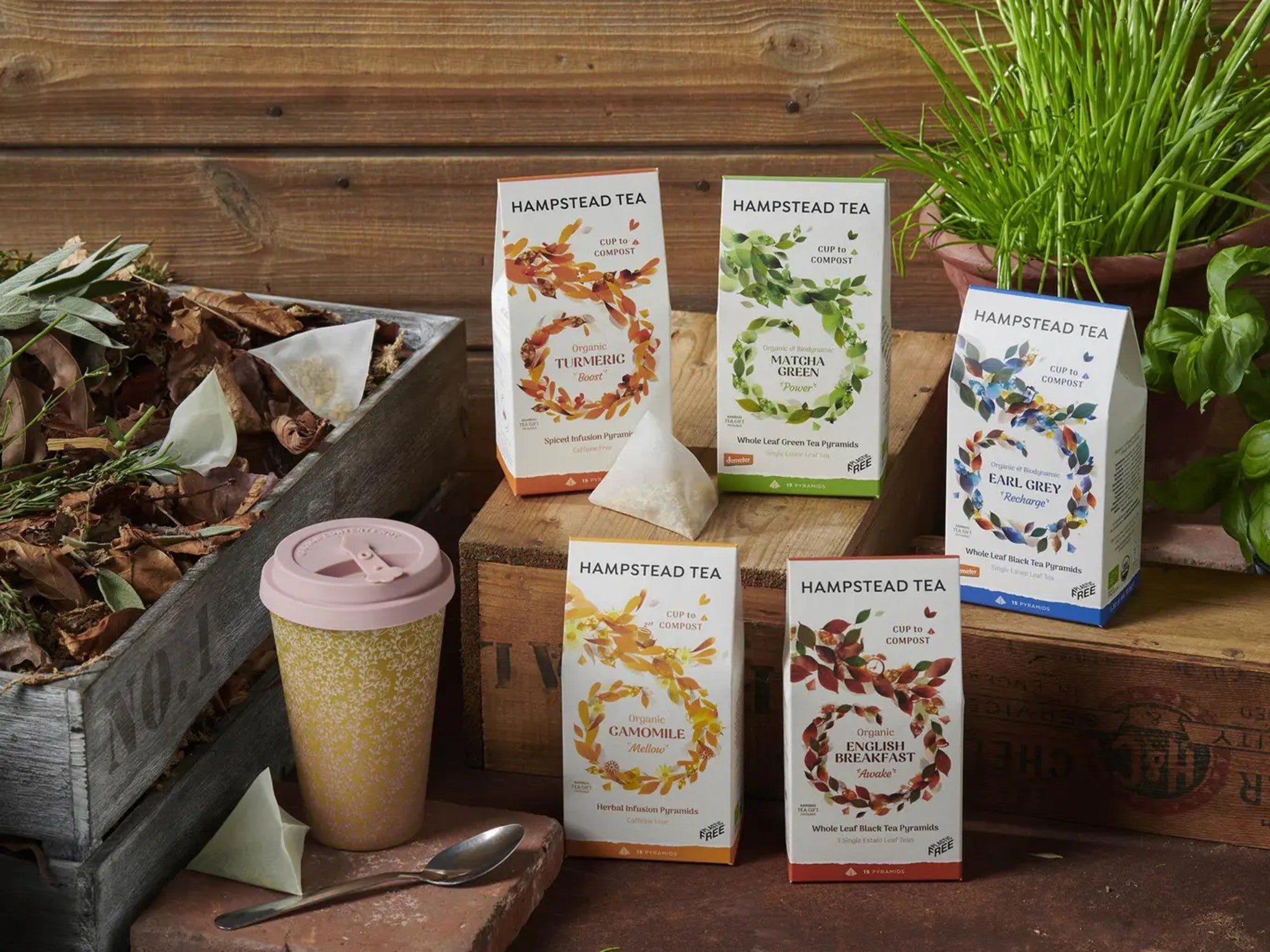
Best: For gifting
We love this brand’s ethos of "cup to compost", where all the pyramids are made from GM-free sugar starch, which is home compostable, along with the inner plastic-look pouch that holds the tea bags. Hampstead Tea was the first company to produce a fully home compostable bag – which takes just 91 days.
The tea is whole leaf and all the ingredients are organic or biodynamic, where no chemicals are used. We love that there’s no string or labels on the bags and it comes with a little handy bamboo tong to grab your bag out – perfect when there’s no spoons in the office. The earl grey makes an excellent, well-rounded brew. There are also plenty other flavours in the range, too.
We Are Tea English breakfast tea, for 15
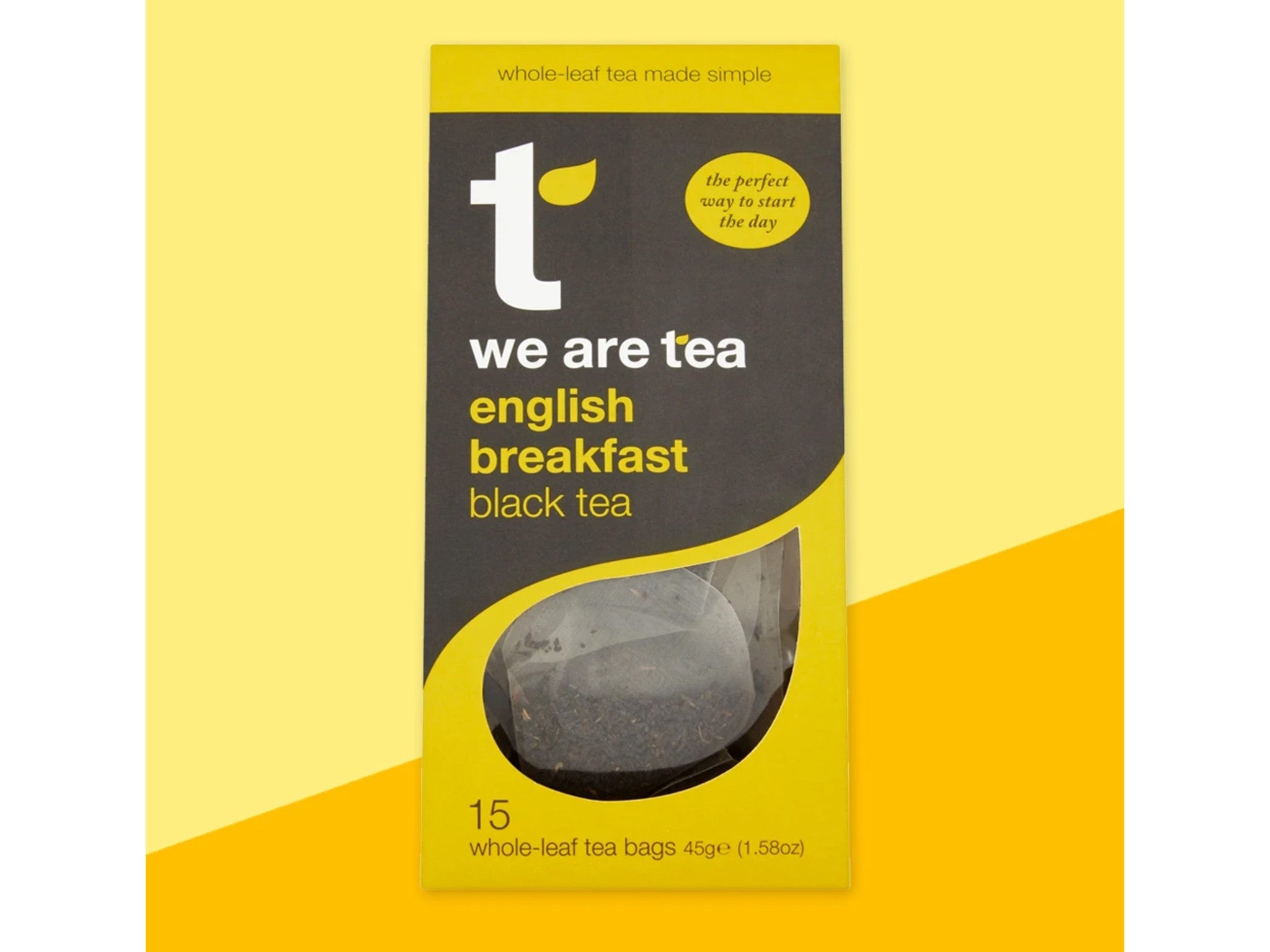
Best: Without string
This whole-leaf tea company started in 2007, and was the first brand to remove the paper tags from teabags. In 2012, We Are Tea joined the Ethical Tea Partnership and moved from nylon bags to ones made from soilon. Each tea bag is sealed by ultrasound instead of glue, which makes them biodegradable at an industrial level between three and six months, so make sure you put them in your council food waste bin. It can go in your home compost, but it will take much longer (at least 18 months). When the tea first launched, the plastic inner part of the packaging was not recyclable, but it’s now made from NatureFlex, too. It makes a lovely cuppa, and we also really rate plenty of other flavours in the range too.
Although the English Breakfast bags are out of stock for now, we’re hoping they’ll be returning soon. Check back for updates.
Eteaket royal earl grey tea bags, for 20

Best: From a cafe
Based in Edinburgh, this ethically sourced tea specialist cafe, which opened in 2008, sells its own brews in tea bags and loose leaf, and is also part of the Ethical Tea Partnership. The tea bags are made from soilon, which isn’t bleached and is biodegradable. The tag is made from paper which is not laminated and is attached to the string via ultrasound, while the inner packaging, made from NatureFlex, is recyclable and can be composted at home. We love this as a weekend morning brew. And definitely head along to the cafe when you’re in town.
Sadly, the earl grey bags are out of stock, but there are plenty of other Eteaket tea bags to browse.
Nemi Tea green tea, for 15
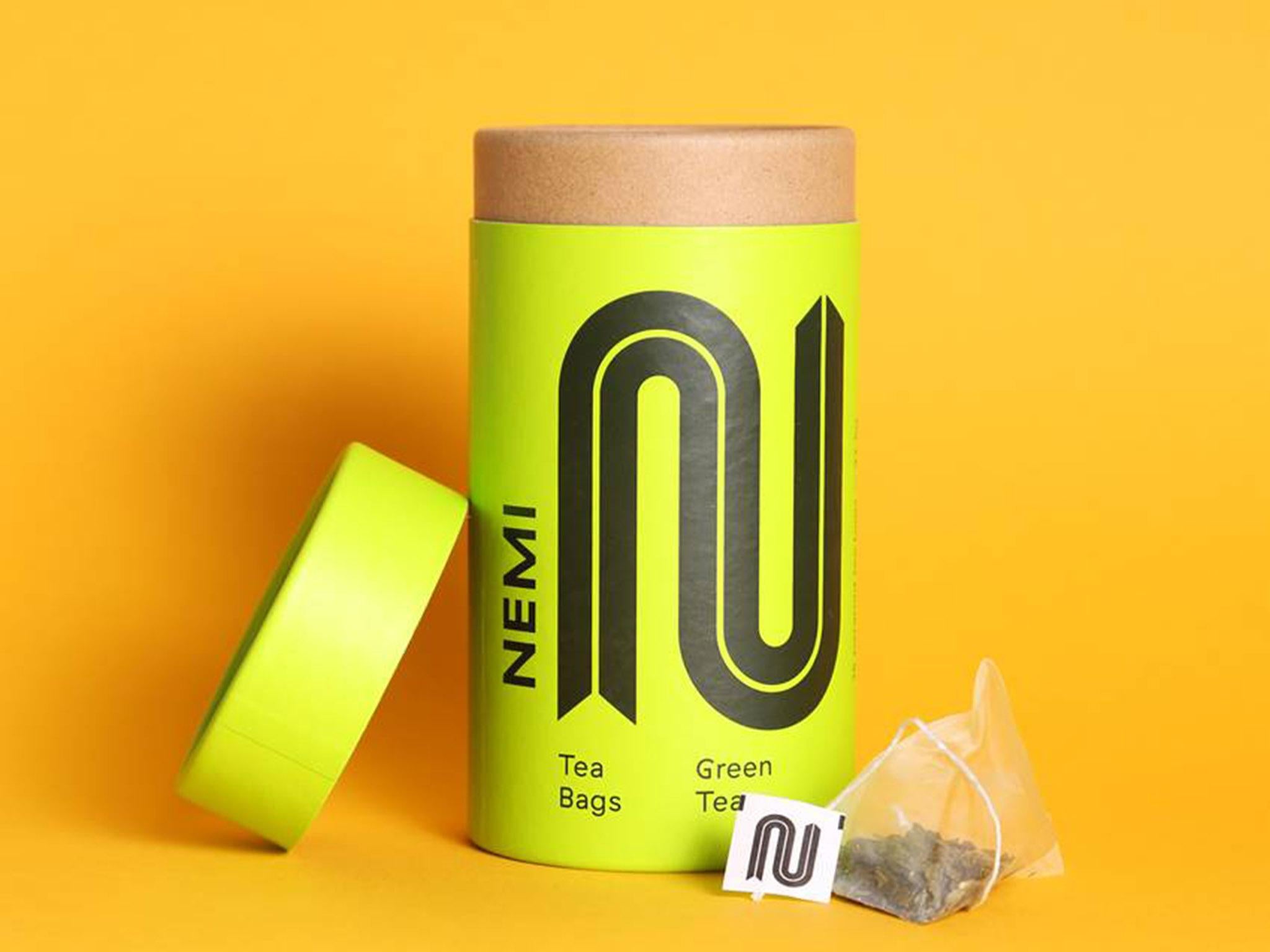
Best: Social enterprise brand
The tea bags at Nemi have always been plastic-free, since launching in October 2017. The pyramid bags are made from soilon, are guaranteed GM free and are totally biodegradable at industrial level. There’s no glue used to attach the string and labels, instead it’s joined by ultrasound and all the packaging is made with NatureFlex. What we love most about this is that the brand also helps refugees integrate into the UK by employing them to run its tea stalls.
T2 French earl grey teabag gift cube, for 25
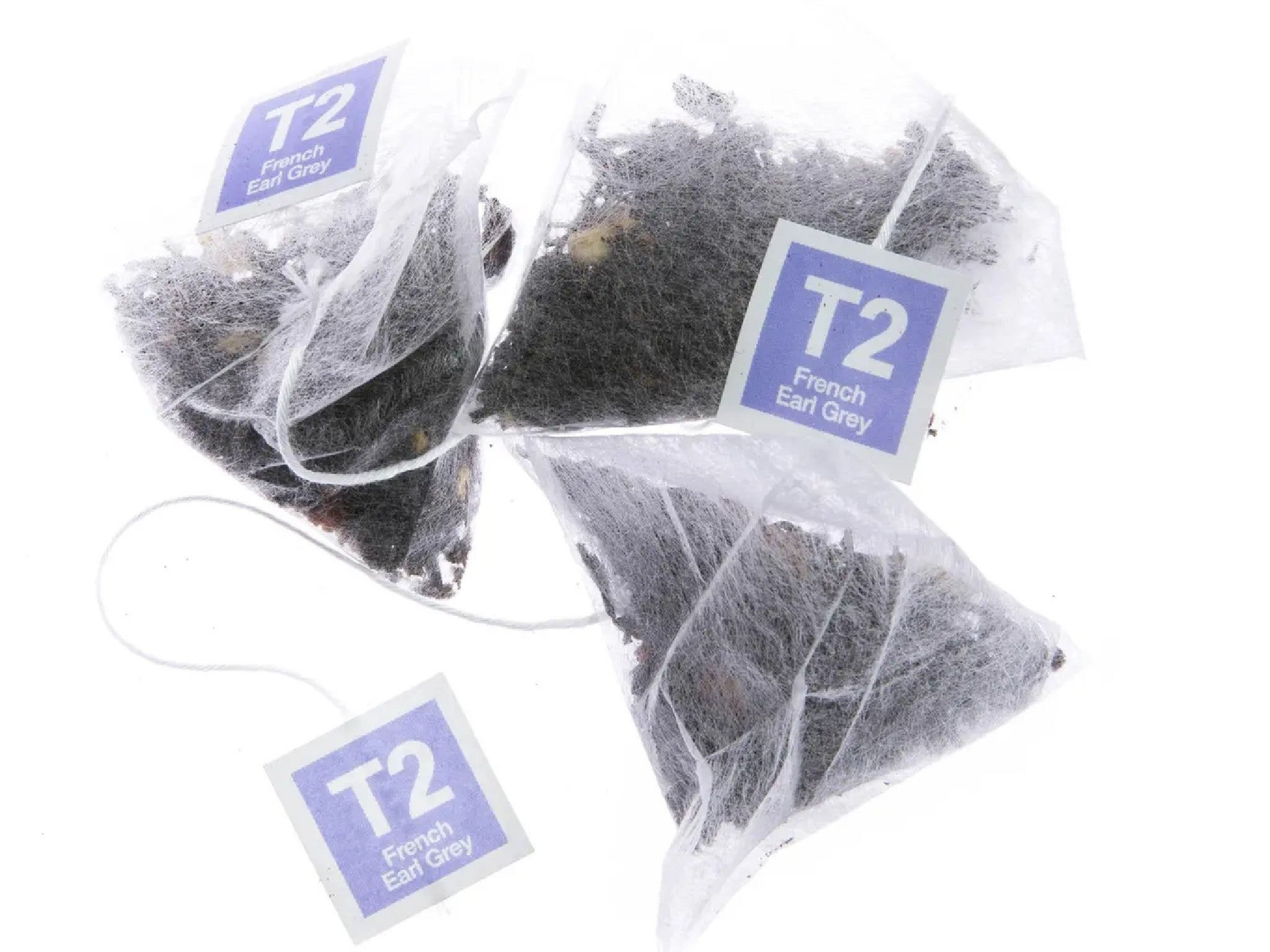
Best: For a weekend brew
This Australian brand, born in 1996 in Melbourne, reached the UK in 2014 when it launched in London’s Shoreditch. It has since opened 14 stores in the capital and takes sustainability seriously. It’s now gained B Corp accreditation, meaning it’s reached incredibly high standards when it comes to sustainability and ethics.
The bags are made from cornstarch, but have a more opaque appearance than any of the others we tested. The bags will breakdown in home composting but it can take a long as 18-24 months, so it’s best to put it into your local council food composting where it will be quicker. The inner plastic is not recyclable, but the brand is working on switching this to a plant based material. This is our favourite new tea for its floral flavour that we love devouring from a pot at the weekends.
Roqberry, for 18
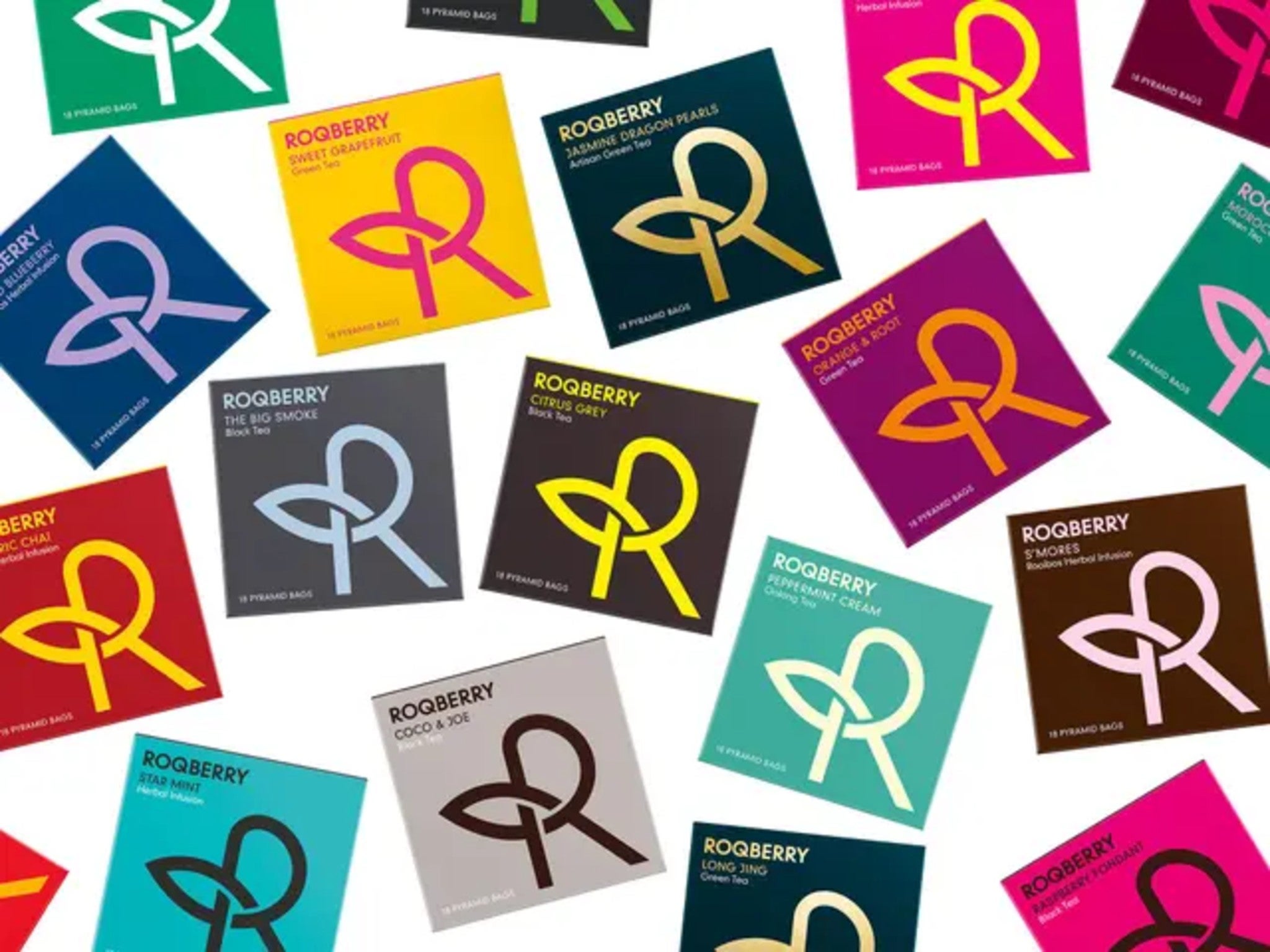
Best: For innovative flavours
After launching in 2017, Roqberry prides itself on “blending the rules” by using classic flavours to create modern fusions such as “aromatic sushi and spice” and “black smoke”. These pyramid tea bags, made from soilon, encase the single-source tea that comes in black, green, herbal, rooibos and oolong, and all are biodegradable. As it won’t breakdown in under a year, this tea bag should be thrown out with your council food waste as soilon composes at industrial standards (in six to eight weeks). The cube boxes are made from FSC paper that’s easily recyclable, too.
Pukka Herbs, for 20
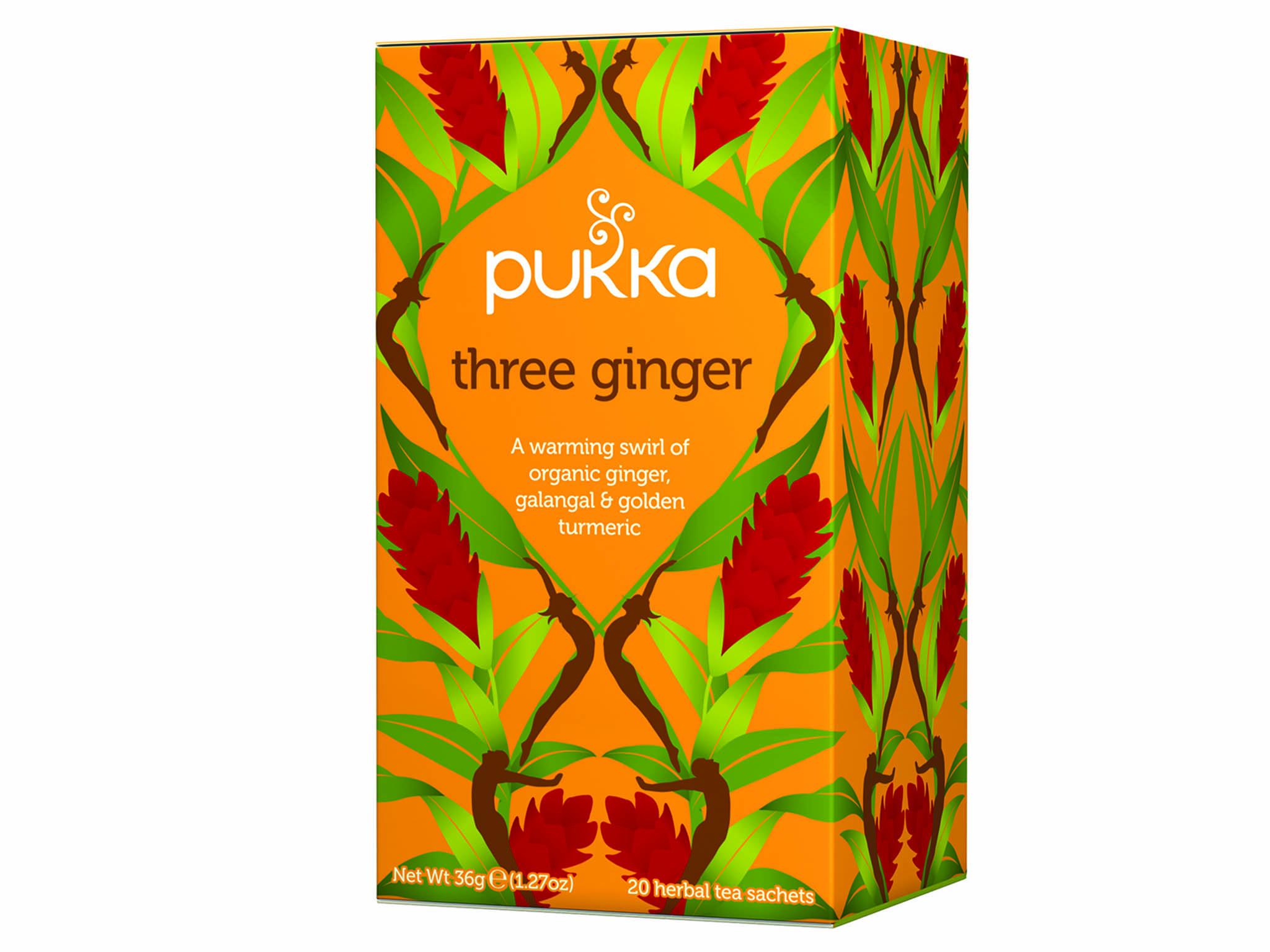
Best: Wrapped in envelopes
Launched in 2001 in Bristol, Pukka Tea’s bags differ from all others as each bag is wrapped in an individual envelope to ensure freshness – and it’s more environmentally friendly than you might think. It took four years of research to develop this new packaging, and it has removed more than 100 tonnes of plastic from the brand’s supply chain. The envelope contains only a very thin layer of BPA and PVC-free plastic, but is still able to be recycled with paper. Since 2014 the brand stopped using a staple to connect the organic string and plastic-free label, and instead uses a little stitch to attach it.
Good & Proper Tea, for 15
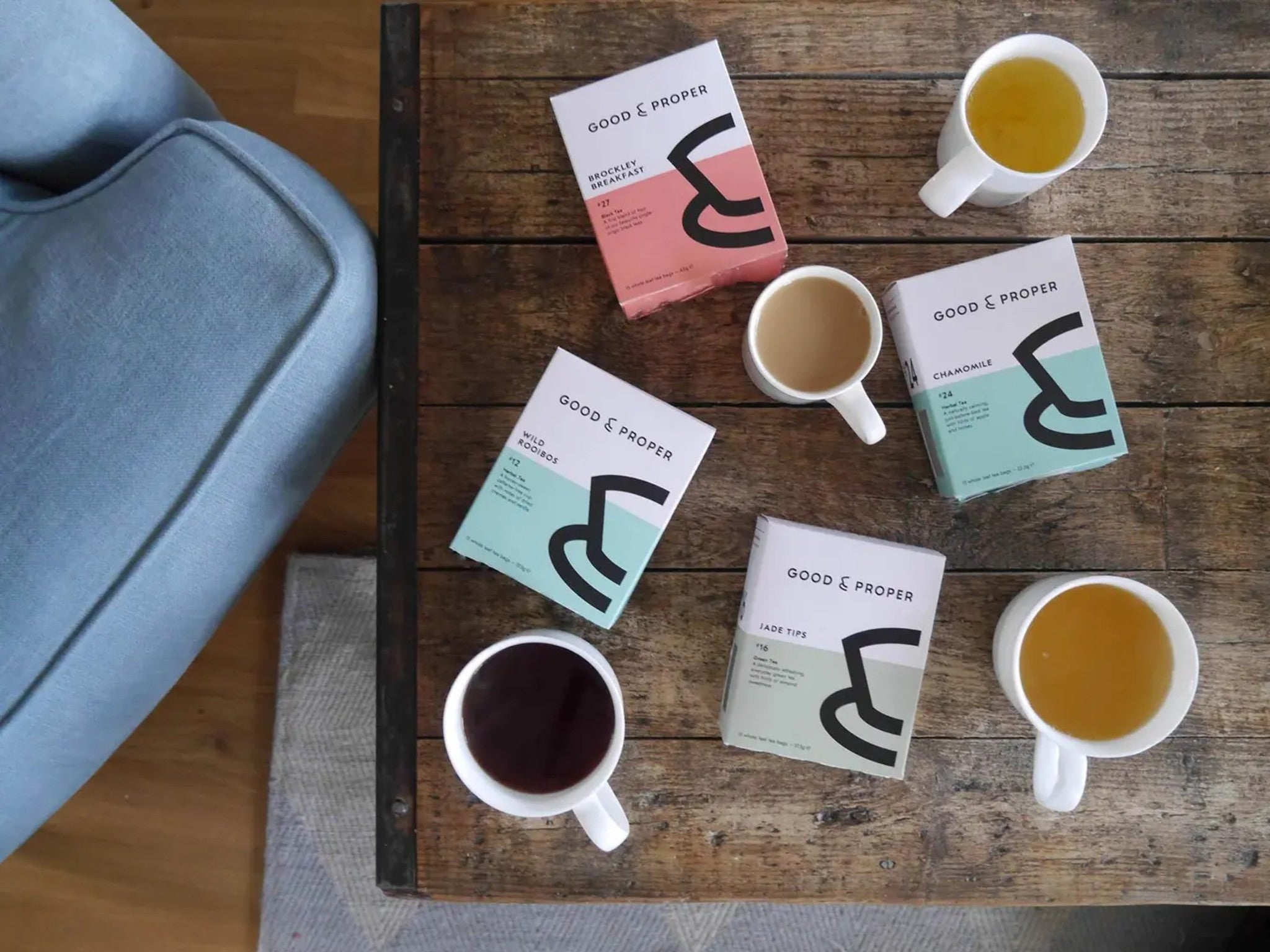
Best: Pillow shaped tea bag
What began life as a mobile tea bar, has now found a permanent cafe in east London. The plastic-free range was added in 2017 and is made from the non-toxic material soilon (which needs to go in a collected food waste bin). These are the largest bags we tested and aside from Clipper’s pillow shaped bags, are the only one that comes in a flat large square shape, instead of the pyramid. Bags are packaged in a plant based plastic alternative called Vegware which is also compostable, but only at industrial levels.
Twinings loose leaf pyramid bag, for 15
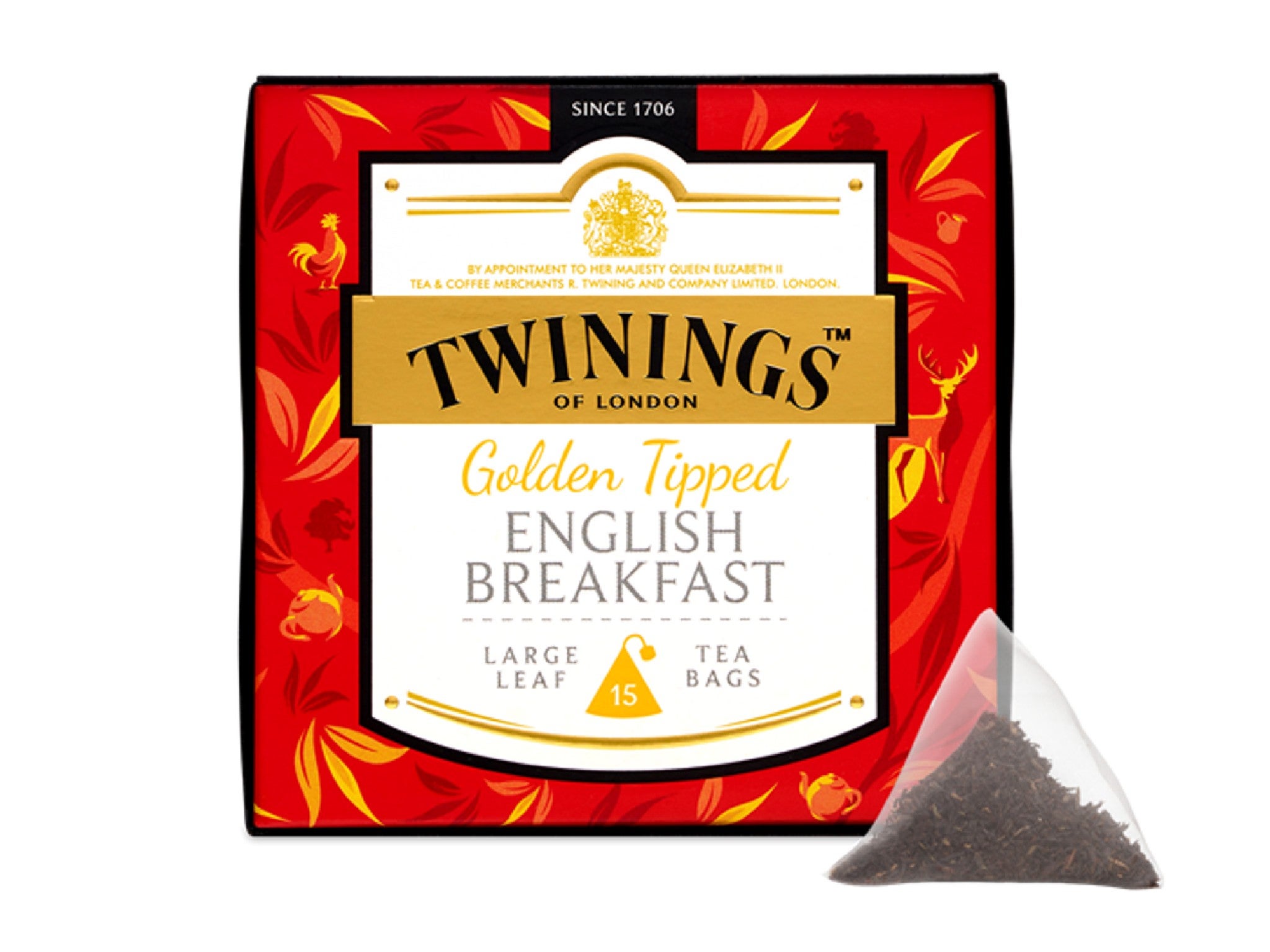
Best: High street brand
The Twinings pyramid tea bags have always been plastic-free since it was launched in October 2014. They are made from maize starch which is treated by an enzyme that allows it to be spun into filaments. The tea bags include loose leaf tea which makes an excellent brew, but each bag has a label attached that’s covered in a thin layer of plastic – so it won’t dissolve if it ends up in your brew, apparently – and will need to be removed before composting. The inner foil wrapper isn’t recyclable, but Twinings is in the process of reviewing its range to find alternatives.
Teapigs everyday brew tea bags, for 15
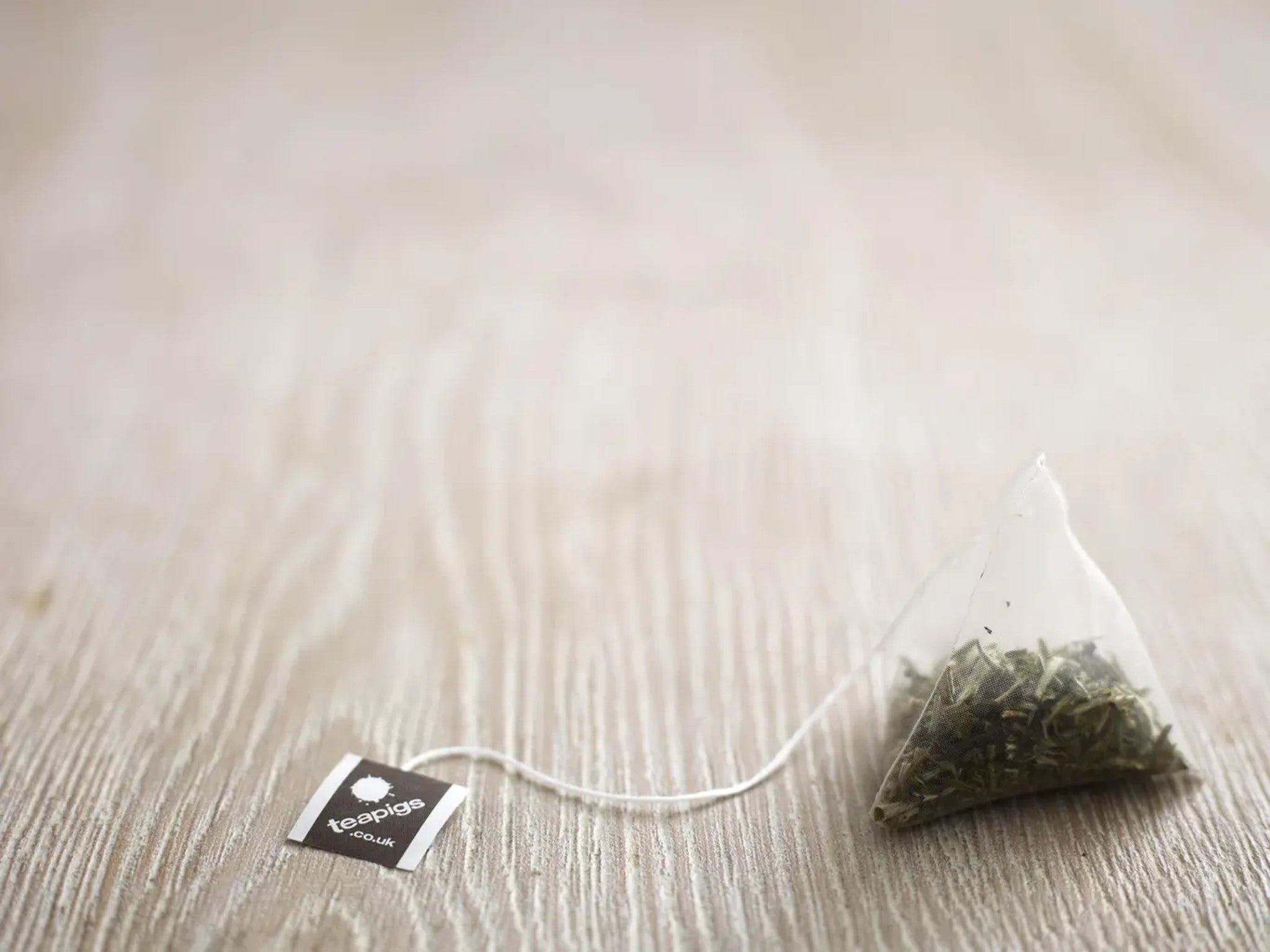
Best: Forward-thinking brand
Teapigs was the first brand to receive the world’s first plastic-free trust mark, created by the campaign group A Plastic Planet in May 2018. These biodegradable bags are made from cornstarch, while the paper tags use vegetable inks and are, you’ll be glad to read, non-toxic. Don’t be dismayed when you open your box, as even the clear “plastic” inner bag (made from NatureFlex) is compostable. The bags can go in your home food recycling bin for compost, which may feel strange, but they will compost.
The verdict: Plastic-free tea bags
While Brew Tea is our favourites, and great for a weekend brew, we think Clipper’s every day tea ticks many boxes and is the best choice for an everyday brew thanks to its affordable price. We also like We Are Tea for removing the label and string – extra brownie points all round.
Voucher codes
For the latest discounts on teas and other groceries, try the links below:
Want more environmentally friendly recommendations? Read our guide to the best plastic-free beauty products